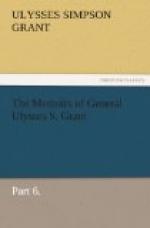“U. S. Grant, Lieutenant-General.
“Major-general H. W. Halleck.”
“Jericho Ford, Va., May 25, 1864.
“If Hunter can possibly get to Charlottesville and Lynchburg, he should do so, living on the country. The railroads and canal should be destroyed beyond possibility of repairs for weeks. Completing this, he could find his way back to his original base, or from about Gordonsville join this army.
“U. S. Grant, Lieutenant-General.
“Major-general H. W. Halleck.”
General Hunter immediately took up the offensive, and, moving up the Shenandoah Valley, met the enemy on the 5th of June at Piedmont, and, after a battle of ten hours, routed and defeated him, capturing on the field of battle one thousand five hundred men, three pieces of artillery, and three hundred stand of small arms. On the 8th of the same month he formed a junction with Crook and Averell at Staunton, from which place he moved direct on Lynchburg, via Lexington, which place he reached and invested on the 16th day of June. Up to this time he was very successful; and but for the difficulty of taking with him sufficient ordnance stores over so long a march, through a hostile country, he would, no doubt, have captured that, to the enemy important, point. The destruction of the enemy’s supplies and manufactories was very great. To meet this movement under General Hunter, General Lee sent a force, perhaps equal to a corps, a part of which reached Lynchburg a short time before Hunter. After some skirmishing on the 17th and 18th, General Hunter, owing to a want of ammunition to give battle, retired from before the place. Unfortunately, this want of ammunition left him no choice of route for his return but by way of Kanawha. This lost to us the use of his troops for several weeks from the defence of the North.
Had General Hunter moved by way of Charlottesville, instead of Lexington, as his instructions contemplated, he would have been in a position to have covered the Shenandoah Valley against the enemy, should the force he met have seemed to endanger it. If it did not, he would have been within easy distance of the James River Canal, on the main line of communication between Lynchburg and the force sent for its defence. I have never taken exception to the operations of General Hunter, and am not now disposed to find fault with him, for I have no doubt he acted within what he conceived to be the spirit of his instructions and the interests of the service. The promptitude of his movements and his gallantry should entitle him to the commendation of his country.
To return to the Army of the Potomac: The 2d corps commenced crossing the James River on the morning of the 14th by ferry-boats at Wilcox’s Landing. The laying of the pontoon-bridge was completed about midnight of the 14th, and the crossing of the balance of the army was rapidly pushed forward by both bridge and ferry.




